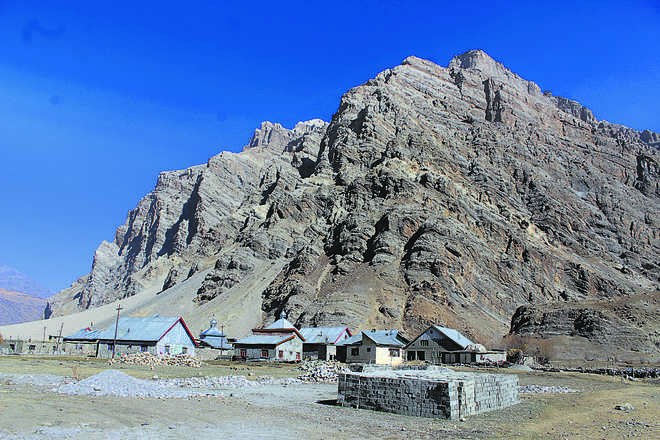
Matayan is located at the foot of a barren mountain. Come winter, the houses will all be under snow. Photo by writer
Azhar Qadri
Tribune News Service
Darchik/Matayan (Kargil), Nov 28
Before the harsh winter comes, Khalida Bano has to cross the pass of blizzards — Zojila — and retreat to a different life.
It is a hard choice for Bano and her family. They have to migrate before a snow wall of 40-60 feet blocks Zojila and the freezing temperature makes it unbearable to live in Matayan, Bano’s village.
(Follow The Tribune on Facebook; and Twitter @thetribunechd)
Matayan is located in frontier Kargil district’s Drass sub-sector, which has a forbidding introduction — the second coldest inhabited place in the world.
“Don’t ask about the winter here,” Bano, 30, said. “If you come here in winter, you will not be able to see this house. It will all be under snow,” she said of her two-storeyed mud and rock house located at the foot on a barren mountain.
The primitiveness of life in Kargil — the site of the last war between India and Pakistan and a region of rugged and hostile landscape — varies from village to village.
Kargil, located along the Line of Control which is manned round the year by soldiers who nestle on mountaintop posts in freezing conditions, is one of the most backward districts of Jammu and Kashmir and has a population of 1.4 lakh. More than half of Kargil’s residents are officially categorised as living below the poverty line.
The district also houses poor infrastructure facilities with its 192 medical institutions — one district hospital and 102 medical aid centres — having a bed capacity of 170.
Matayan is the first habitation beyond Zojila and it has basic facilities — a middle school and a medical aid centre. Even though it is only 120 kilometres from Srinagar, the village and its residents are caught in a time warp.
During the six months of extreme winter, the frontier district remains cut off from the rest of the world. Its only road link — which snakes through the mountains and the high-altitude Zojila pass — is usually closed by November 15, but is opened for a few days thereafter, weather conditions permitting. “This village gets divided. Some go to the other side of Zojila and some to Drass and Kargil to live with relatives or on rent,” Bano said.
Kangan, a township on the other side of Zojila pass in Kashmir valley, is Bano’s winter home.
The family then waits for the winter to end before returning to Matayan in early summer to continue farming.
Winter temperatures can plummet to minus 40 degrees Celsius. “There is no arrangement here for winter. There are no doctors and no firewood,” Bano said.
For centuries, the Matayan villagers had no idea of a world beyond the pass.
When the snow melted in the summer of 1999 and opened the road to Kargil, it also unfolded a war as the Pakistani army had taken over mountain peaks overlooking the highway and shelled the incoming convoys. The villagers of Matayan were asked to move and, for many, it was the first time they made an arduous journey across the pass.
“We travelled by foot to Sonmarg and Kangan,” Khadija, a wrinkle-faced mother of four, recalled. Sonmarg, a meadow resort, and Kangan, a township, lie on the other side of Zojila pass.
Matayan is not an exception in Kargil, one of the two districts that form Ladakh region. In the shepherd village of Hondurman, the residents — whose major income is generated by working as porters to mountaintop Army posts — migrate from their summer huts to winter huts, located on opposite ridges.
November is a busy month in Kargil. Hundreds of trucks make the hard journey to the district with stocks of rice, flour, firewood and everything that is essential to survive a winter in isolation. The stocks are stored before the winter’s first snow.
Many shops, groceries and motels are run by ethnic Kashmiris, who are readying to resign to their homes in Kashmir before the winter comes, leaving the main market half-deserted.
Life in Darchik
In the terraced village of Darchik, home to goat herders who have lived in isolation for centuries, Tashi Dawa prepares for the 70th winter of his life.
“I have spent my entire life in this village,” Dawa said, uncomplaining about the lack of facilities. “We don’t have enough money to migrate anywhere,” he said.
Darchik is nearly 300 km from Srinagar and is a remote village in Kargil’s Batalik sector. The villagers, who believe they are of Aryan descent, live a self-reliant life by herding goats and farming. A bus travels twice a week to this village of 80 families. “The government doesn’t really care for us,” he said. “Whether we die or live, it doesn’t matter.”



























